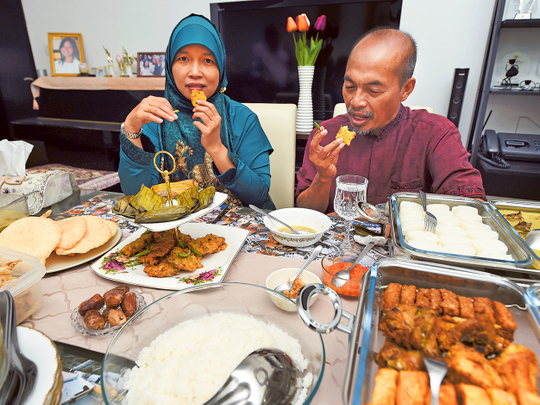
Abu Dhabi: In a quiet downtown just outside the capital, Nasuki Marsali and his wife Sukarsi Djiman are preparing to end their Ramadan fast.
The Indonesian family is incomplete without their son Tanwin Nun and daughter Ila Kuntum but for the first time in several years, they are sans their wards during the Holy month. Educational commitments have forced the siblings to stay away from home and understandably, a lull is clearly evident in the air.
Even before you can enquire about the duo’s whereabouts, the mother quickly breaks her silence and her face lit up to speak about her children. “Son is studying computer science in Vancouver, Canada and daughter is doing her masters at Masdar Institute of Science and Technology and stays at their hostel. But most of the dishes prepared today are as per their liking,” says Djiman, pointing to delicacies meticulously arranged on the table.
There is still sometime for the fast to end and Djiman slid the window pane slightly to hear the call for Adhan from the nearby mosque.
Unlike the Arabic tradition of breaking fast with a piece of date, the Indonesian culture marks Iftar with a drink; though a bowl full of it still marks the cuisine here.
It clearly shows the cultural crisscross as the family has been residing in the Middle East for over two decades.
Marsali is quick to notify that there is no place for dates in their buka puasa (Iftar).
“We start with this sweet drink Kolak and it is served cold to quench the thirst and along with it we have Nagasari,” said Marsali, who has served the UAE Navy for 13 years and is currently working with Emirates Classification Society.
Marsali was right as Kolak made of coconut milk, green peas, brown sugar and ripe bananas turned out to be a prefect refreshing drink on an empty stomach.
Nagasari was a traditional steamed cake wrapped in banana leaf and made from rice flour, coconut milk, sugar, filled with slices of banana and perfect for a quick bite.
Spice also plays an integral part of the Indonesian food and you would gauge that if you pop in their vegetable and flour-based dish Bakwan. Make sure you have a glass of water besides you though, as you have to simultaneously try it out with a green chill – a perfect blend for all the spice lovers but a strict no no for those with taste buds that can’t handle them.
“Indonesian food has a mixture of Indian and Chinese food you can say. Our curry has a lot of spice and soups are like Chinese. Those who want their food more hot then here’s this spicy paste called sambal comprising of chill, onions and garlic,” informs Marsali, handing it to me and already having burned my lips I politely refuse to try.
For starters, there is Tempeh and Tahu – soya bean recipes and curries with chicken and lamb goes well with Lontong which is compressed rice cake wrap made inside a banana leaf or plastic.
Marsali and Djiman, however, reveal that Ramadan tradition back home is a lot more fun-filled and the night is like a festive occasion. “They use music to wake the people for suhoor. They form small groups, go around the village and sing love songs, traditional songs beating ‘bedug’ drums. Now people also play guitars and other instruments. Kids play with fireworks so everything is lively. So we fast during the day and it is like celebration time at night,” recollects Marsali, who informs that the Indonesian Embassy also tries to give the young generation an insight into the Indonesian culture by organizing various events.
“At the embassy we do meet for Iftar and each family is asked to cook something or the other and we have the meal together. The tradition in various provinces of Indonesia is different so in order to make our kids aware about it we have cultural events. We also call in guest from back home to speak of our religion and the things we follow,” revealed Marsali before signing of for the Taraweeh prayers.









